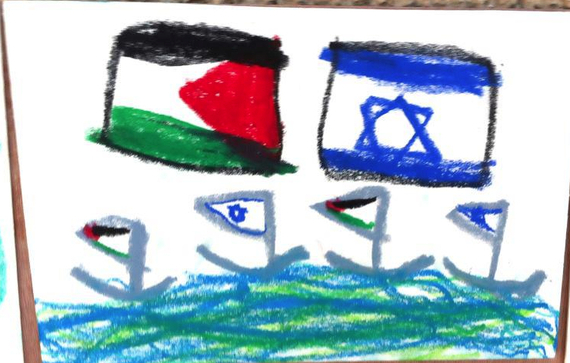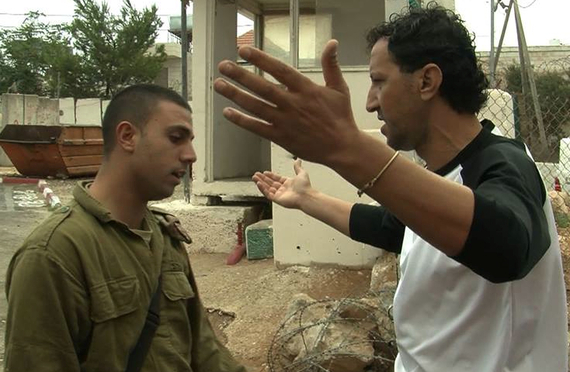The Israelis and Palestinians are negotiating again. And with it, the oft-repeated Israeli refrain -- uttered this time by Moshe "Boogie" Ya'alon, the Israeli Defense Minister appointed by Bibi Netanyahu -- "We have no partner on the other side."
Ali Abu Awwad, a Palestinian non-violent activist, has been a partner for peace for over 10 years. After Ali's brother was killed -- shot in the head by an Israeli soldier during the Second Intifada in October, 2000 -- Ali and his mother joined the Bereaved Families Forum, whose members (Palestinian and Israeli) have all had family members killed by the conflict here. Later Abu Awwad, together with Robi Damelin (an Israeli mother whose son was also killed in the violence of the Intifada) made presentations around the world, about reconciliation and non-violence being essential tools towards peacemaking.
Boogie has probably never shared the stage with a Palestinian, or had one visit his home. Abu Awwad, on the other hand, had Israeli visitors from the Bereaved Families Forum visit his home in 2002. He told me, "That was the first time I saw an Israeli cry... before that, I was convinced I am the only victim, and they are the enemy."
Abu Awwad is trying to raise funds to finish writing and self-publishing his book, Painful Hope, stories and thoughts about his experiences of the past ten years. He wants to print 5000 copies, in Arabic, Hebrew and English. He told me he plans to give away 1000 of these "to Palestinian local leaders, to soldiers at checkpoints, and elsewhere."
To me, a book on non-violence and reconciliation, published in the main three languages of our region, and distributed to many communities on both sides, is extremely important. These days as tension rises in the West Bank, the voice of reconciliation from Palestinians is very rare, and important to hear for both us Israelis and our Palestinian neighbors.
Abu Awwad spent four years in Israeli prison, during the First Intifada -- charged with throwing stones, Molotov cocktails, and for being a member of a military cell. During this time, he went on a 17-day hunger strike -- he says that experience for him was "the first 'click' to non-violence." In prison, he began to read the works of Gandhi, Mandela, and Martin Luther King. He realized that peace is a place where you have to "Look in the mirror and say, 'Maybe I'm not totally right."
Most Israelis (and many Palestinians), especially in talking about the conflict here, have a hard time saying 'Maybe I'm not totally right.' It makes one feel a bit insecure, and many of us don't like feeling insecure.
Abu Awwad's vision might be exactly the opposite of many Israeli leaders, who often envision the goal of the current negotiations as a "divorce." He says in the video above that, on the other hand, "Palestinian freedom should pass through Israeli hearts." In other words, without a reconciliation process, no "divorce" will be amicable, or stay that way very long.
More than a year ago, Abu Awwad and several other Palestinians and Israelis founded a grassroots movement called "Leading Leaders for Peace." In that time, they have organized several silent, joint marches for Palestinians and Israelis. The marches have taken place in Beit Jala (a town between Bethlehem and Jerusalem, accessible to both Palestinians and Israelis) and elsewhere. Thes marches have brought together as many as 200 Palestinians from throughout the West Bank and the same number of Israelis from throughout Israel.
Last month, for the first time, they planned to hold the march in Tel Aviv/Yaffo. They dutifully applied for permits for 300 Palestinians (since the end of the Second Intifada, Palestinians are not allowed to cross into Israel proper, unless they apply for a permit from the Israeli army).
Ruby Peled, a member of Leading Leaders for Peace and a former IDF officer, told me that the army and police had OK'd the permits. But then Ya'alon at the last minute got involved, and "for political reasons, he said no" to the permits. Peled said, "For sure, he has fears, this is the reason he did it."
Abu Awwad also talks about the power of Israeli fear: "The Jews are not my enemy; their fear is my enemy. We must help them to stop being so afraid -- their whole history has terrified them -- but I refuse to be a victim of Jewish fear anymore."
Of course, there are Palestinian extremists, just as there are Israeli extremists. To move towards peace, we should empower the peacemakers on both sides. A well-known Israeli leader once said we must, "Fight terrorism as if there is no peace process; and pursue peace as if there is no terrorism."
Listening, Boogie? Listening Bibi? Are you a partner for peace?
A version of this article appeared originally in Times of Israel.

